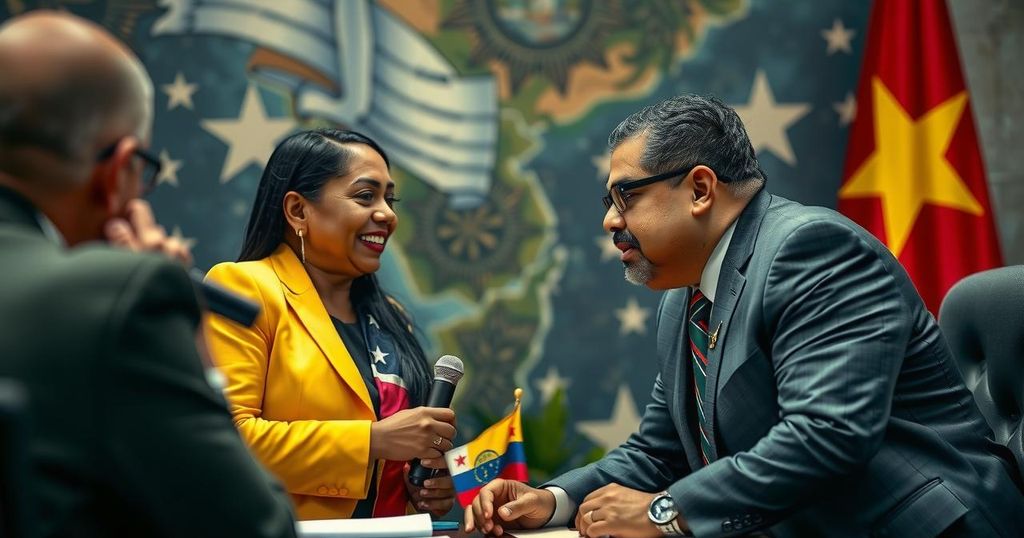SVG Prime Minister Advocates for Maduro’s Presidency Regarding Guyana’s Oil Interests
Prime Minister of Saint Vincent and the Grenadines, Dr. Ralph Gonsalves, expressed that Nicolas Maduro’s presidency is favorable for Guyana’s oil sector. He emphasized the need for dialogue and declared opposition to military conflicts regarding territorial disputes. Gonsalves defended the integrity of Venezuela’s elections, referencing the U.S. historical interference in Latin America, and highlighted the importance of regional cooperation and peace.
In recent statements, Prime Minister of Saint Vincent and the Grenadines, Dr. Ralph Gonsalves, indicated that the re-election of Nicolas Maduro as Venezuela’s president is beneficial for the government of Guyana, particularly in relation to its burgeoning oil sector. Speaking during a visit to Guyana for the funeral of statesman Sir Shridath Ramphal, Gonsalves articulated that the election results demonstrate Venezuelans’ rejection of the right-wing opposition, which he believes would endanger the stability and security of Guyana’s oil investments. He remarked, “If you have a choice between Maduro and the right wing in Venezuela, I advise you to choose Maduro. The right wing will seek to allow the Americans to take the oil in Venezuela, to set up to take over PDVSA (State oil company) and try to run Guyana’s oil industry from Caracas.” Moreover, Gonsalves reaffirmed his commitment to peace in the region, categorically opposing any military actions by Venezuela regarding the Essequibo Region. He stated, “Anytime, if Venezuela attempts to do anything militarily, you’ll hear that I speak against it… Under anybody. No war. You have a problem, you talk about it, you solve it.” His comments reflect a broader desire for diplomatic resolution over military confrontation, similar to his views on other global conflicts. The prime minister’s sentiments came in the context of the Argyle Declaration for Dialogue and Peace, which sought to foster understanding between the governments of Guyana and Venezuela, with the assistance of nations like Brazil and Saint Vincent and the Grenadines. Gonsalves has been a longstanding supporter of diplomacy and dialogue, especially in light of the historical tensions regarding territorial claims made by Venezuela against Guyana. In addressing criticism concerning the integrity of Venezuela’s recent elections, Gonsalves defended his belief in their fairness, based on historical American meddling in Latin American politics. He asserted, “America can’t teach me about elections and democracy. In my lifetime, I watched what has happened.” This statement underscores his viewpoint on the nature of international relations and allegations of electoral impropriety. The discourse surrounding Venezuelan elections is made particularly relevant by the context of international investments in the oil sectors of Guyana and Suriname, who have jointly called for verification of the electoral process in Venezuela. Despite a division within the regional bloc on this statement, Gonsalves maintains that constructive engagement and friendship with the United States, alongside an acknowledgment of historical grievances, are crucial for regional stability. He remarked, “I’ve said repeatedly that the Americans are our friends… but we have seen historically, they have not yet been able to get out from the ghost of Munroe.”
This article discusses the geopolitical implications of Nicolas Maduro’s presidency in Venezuela and how that relates to Guyana’s growing oil sector. With significant developments in oil production and exploration, the political landscape surrounding Venezuela’s leadership plays a critical role in regional security and economic opportunities. Prime Minister Ralph Gonsalves emphasizes the contrast between Maduro’s administration and potential right-wing alternatives that could jeopardize Guyana’s oil interests, suggesting a preference for dialogue over conflict in addressing territorial disputes. The interplay between the United States’ historical influence and current political dynamics in the Caribbean is also a focal point.
In summary, Prime Minister Ralph Gonsalves posits that Nicolas Maduro’s continued presidency is advantageous for Guyana as it safeguards its oil sector from potential threats posed by right-wing Venezuelan factions. His commitment to peaceful resolution of territorial disputes and the underlying historical context of U.S. interference in the region highlights the complexities of Caribbean politics. The discussion illustrates the delicate balance of power and the importance of regional solidarity amidst external influences.
Original Source: caribbean.loopnews.com








Post Comment